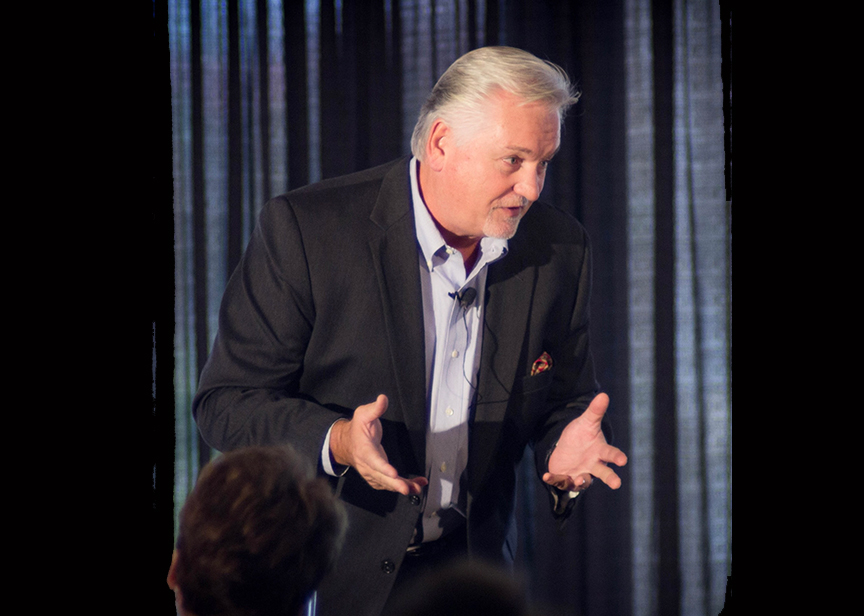
How do the best motivational speakers in the world capture the attention of thousands and drive them to do better by themselves and their organizations? Every leader would like to think of themselves as a role model to their team, but the pressure and expectations that come with the role can be stifling.
However, celebrity motivational speaker Steve Gilliland says that the less you concern yourself with your leadership style, and the more you focus on being a present participant, the more likely you are to succeed.
As a manager, you embody an essential aspect of any organization as it sets the tone for the company’s culture, values, and philosophy. The way a boss chooses to guide their team can greatly impact the team’s performance and productivity. Each leader has a unique way of doing things, which says a lot about their personality, character, and contribution to the workforce.
One of the most common leadership approaches is the visionary approach. A visionary manager has a clear and inspiring vision for the future. They’re passionate about their goals and inspire their team to work toward a common vision. This approach is associated with creativity, innovation, and the ability to see the big picture, qualities that corporate motivational speakers find extremely positive. Visionary leaders can have a positive impact on the organization by driving change, encouraging innovation, and creating a culture of ambition and growth.
Autonomy and positivity are two integral components of a productive workplace. Autonomy refers to the freedom and independence that employees have in their work. It allows individuals to take ownership of their work and make decisions that impact their work processes. When employees have autonomy, they are more engaged and motivated, as they have a sense of control over their work and can make decisions that align with their goals and values.
Positivity, on the other hand, refers to a workplace culture that is supportive, collaborative, and empowering. A positive workplace fosters a sense of community where employees feel valued, respected, and appreciated for their contributions. A positive workplace culture encourages individuals to work together toward common goals, fostering a sense of teamwork and promoting open communication and constructive feedback. Celebrity motivational speakers highlight the importance of this attitude in the workplace.
When autonomy and positivity are combined, they create a work environment that promotes creativity, innovation, and productivity. Employees who have autonomy and work in a positive environment are more likely to take risks and try new things, which can bring on breakthrough ideas and solutions. Additionally, employees who feel valued and respected are more likely to stay engaged in their work, which can lead to increased productivity and job satisfaction.
Autonomy and positivity can also contribute to a strong sense of employee well-being. When employees feel in control of their work and work in a positive environment, they are more likely to experience lower levels of stress, burnout, and absenteeism. This is why companies love hiring inspirational and motivational speakers. By promoting a culture of autonomy and positivity, organizations can improve employee well-being, increasing productivity, retention, and overall success.
Another approach is the transformational approach, in which the leader inspires their team to achieve their full potential. They foster a positive work culture and encourage personal growth and development. This approach is associated with high levels of motivation, engagement, and productivity. Transformational leaders can have a positive impact on the organization by fostering a sense of purpose and meaning, creating a supportive work environment and promoting employee well-being.
Directing with kindness also means treating others with respect and dignity, regardless of their position or level of authority. This can contribute to a culture of trust and respect, where individuals feel safe and supported to share their ideas and concerns, teaching better collaboration and problem-solving.
It’s important to note that leading with kindness does not mean being passive or avoiding difficult conversations or decisions. Positive leaders who show kindness can balance empathy and compassion with a strong sense of purpose and direction. They can provide constructive feedback and guidance to their team members while also supporting and empowering them to reach their full potential.
A democratic approach involves valuing input and feedback from team members. Democratic leaders involve their teams in decision-making processes and encourage collaboration and teamwork. This approach is associated with open communication, inclusivity, and a sense of community. They can have a positive impact on the organization by promoting teamwork, improving communication, and creating a culture of transparency and openness.

It’s not static or fixed. It requires continuous learning, growth, and development. With dedication and commitment, anyone can develop the skills and qualities needed to become an effective leader.
Leading with kindness is not a sign of weakness, it can be a powerful and effective leadership style that can have a positive impact on the people you manage, the organization, and the overall workplace culture.
Kindness is often associated with empathy, compassion, and understanding. According to inspirational speakers, when leaders demonstrate these qualities, they create a work environment that is supportive, collaborative, and empowering. Employees who feel valued, respected, and appreciated are more likely to be engaged and motivated, leading to increased productivity and job satisfaction.
The coaching approach involves the managers focusing on developing their team’s skills and abilities. They provide feedback and guidance to help their team members grow and succeed. This approach is associated with high levels of personal development, skill-building, and job satisfaction. Coaching leaders can have a positive impact on the organization by improving employee skills and abilities, promoting continuous learning and development, and creating a culture of growth and improvement.
By setting high standards for themselves and their team, they create a culture of excellence and foster a sense of purpose and meaning. When leaders inspire their team members, they create a positive work environment where individuals feel motivated and engaged, making way for increased job satisfaction, improved performance, and a stronger sense of loyalty to the organization. By shaping the future careers of their team members, leaders contribute to the overall success and growth of the organization.
A servant leadership style puts the needs of the team members before the leader’s own needs. They prioritize the well-being and success of their team members and work to create a positive work culture. This approach is associated with empathy, compassion, and a strong sense of ethics. Servant approaches can have a positive impact on the organization by improving employee satisfaction and retention, fostering a sense of purpose and meaning, and promoting a culture of care and concern.
Each approach has unique benefits and can impact the organization in different ways. For instance, visionaries can bring innovation and growth to an organization, while transformational leaders can motivate their team members to work toward a common goal. Democratic facilitators can improve communication and teamwork, while coaches can help employees build their skills and abilities. Servant leaders can foster a positive work culture and promote employee well-being.
Embracing your personal style and adapting to the organization can help you become more impactful, promoting a positive work culture and driving success for the organization. The top-rated business speakers emphasize the idea of exploring your own abilities and instincts.
Authority figures play a critical role in shaping the career paths of team members. An inspiring executive can help their team members identify and pursue their goals, develop their skills, and achieve their full potential. Inspirational directors lead by example, demonstrating passion, commitment, and dedication in their work.
Management and administration aren’t innate or limited to a select few individuals. Anyone can become a leader with the right mindset, skills, and determination. While some people may have natural administrative qualities, such as charisma, confidence, and vision, leadership is also a learned skill that can be developed over time.
Leadership material is not limited to a specific set of characteristics or traits. Rather, it encompasses a range of skills, attributes, and qualities that are essential to effective mentoring. According to the best motivational speakers, some of the key qualities that are often associated with effective leaders include:
Influential figures have a clear vision for the future and the ability to inspire others to share and work toward that vision.
Effective authorities have exceptional communication skills, including the ability to listen actively, articulate their ideas clearly and persuasively, and provide feedback and guidance to their team members.
Passionate leaders empathize with their team members and can understand and appreciate their perspectives and needs.
Leaders operate with integrity, treating others with respect and honesty and upholding ethical principles and values.
They’re adaptable and able to respond to changing circumstances and challenges.
Practical leaders have a strategic mindset and can analyze complex situations, identify opportunities and challenges, and develop and execute plans to achieve their goals.
Great mentors have a high degree of emotional intelligence, including self-awareness, self-regulation, motivation, empathy, and social skills.
Steve Gilliland is a professional speaker who’s renowned for his strong commitment to balancing the practical and the positive. If you need a funny speaker for conferences who will give your employees an all-new perspective, click here to book Steve. You can also check out this business motivational speaker’s online material and virtual bookstore!
“Every credit union and state credit union association needs to hear Steve Gilliland. He serves on the board of a credit union and is a member of the prestigious Speaker Hall of Fame, which makes his message in our industry unrivaled and unforgettable.” – Dion Williams, CEO, Piedmont Advantage Credit Union